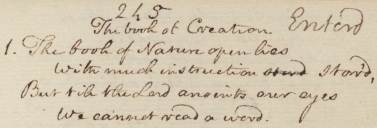|
Olney Hymns Book 2 Hymn 81
The book of nature open lies...
Manuscript Hymn No. 245

CREATION
The book of creation
The book of nature open lies,
With much instruction stored;
But till the Lord anoints our eyes
We cannot read a word.
Philosophers have pored in vain,
And guessed from age to age;
For reason's eye could ne'er attain
To understand a page.
Though to each star they give a name,
Its size and motions teach;
The truths which all the stars proclaim,
Their wisdom cannot reach.
With skill to measure earth and sea,
And weigh the subtle air;
They cannot, Lord, discover thee
Though present everywhere.
The knowledge of the saints excels
The wisdom of the schools;
To them his secrets God reveals,
Though men account them fools.
To them the sun and stars on high
The flowers that paint the field, (a)
And all the artless birds that fly,
Divine instruction yield.
The creatures on their senses press,
As witnesses to prove
Their Saviour's power, and faithfulness,
His providence and love.
Thus may we study Nature's book,
To make us wise indeed!
And pity those who only look
At what they cannot read. (b)
(a) Matthew 6:26-28
(b) Romans 1:20
 |
|
from John Newton's Diary, relevant to this hymn:
Tuesday 4 June 1776
Ah my Lord I seem to be Something when among my fellow creatures, but am a very Nothing in thy sight – a poor heartless worm. I had words to speak at the Great House, but to myself – words without feeling. I am beset with evils, which like the canker upon a tree keep me low. O Lord put forth thy power – blow with thy wind, dissolve the ice and cause the waters to flow.
Thursday 6 June 1776
Met the children and preached in the evening. Little remarkable unless my dullness and indolence be so. I seem more remiss than ever in the improvement of my time – days pass away and little done or attempted.
Friday 7 June 1776
It was not a profitable day, though we wished it so. I feel O Lord that when thou leavest me to myself I can do nothing. I deserve to be still more left to myself, for alas I often wilfully leave thee.
Saturday 8 June 1776
Another poor day. Finished my hymn, and wrote much of a letter to Lord Dartmouth, which after all I believe I shall not send. My Saturday evenings used to be some of my best times. Of late they have proved as poor as the rest. The spirit of prayer has been much restrained, and anything is welcome that keeps or calls me from it.
Sunday 9 June 1776
A cold, barren frame in the morning. Spoke in the forenoon at a venture but had liberty, and likewise in the evening. Afternoon more confused and confined. O Lord pardon and accept my poor best. I know thou helpest to speak important truths to the hearers. O that thou wouldst preach them with power to my own heart. The Epistle to Sardis which I begun to expound last week struck me today as if especially directed to me. Surely the application will bear in many things. I hope I have more than a name to live, that I am not utterly dead. But I am in a languishing state, and have need to hearken to a call to watchfulness and repentance, but alas what can I do, without thy enabling power. O come I beseech thee, not in judgement to fill me with confusion, and to fight against me, but in love and mercy to heal my wounds and renew my strength. Had a good time at the Great House, in showing the right use and study of the works of creation.
Job 8:7
Revelation 3:2,3
Hymn No. 245
[On this date Newton preached from the above texts at his church, St Peter & St Paul, Olney, during the morning and afternoon services, and from this hymn at the informal evening service]
In the absence of any apparent direct links from Newton’s diary to this hymn, it may be of interest that this hymn always reminds me of Newton’s association with the Ludlam brothers of Leicester, in particular of William Ludlam, who published Astronomical Observations made in St John’s College, Cambridge, in the years 1767 and 1768: with an account of several astronomical instruments, Cambridge, 1769. Ludlam did indeed teach 'the size and motions of the stars', and had the 'skill to measure earth and sea, And weigh the subtle air', but seemed only able to 'look' and not 'read' Nature's book. Despite his absorbing capacity for intricate measurements, he exemplified those described in this hymn:
They cannot, Lord, discover thee
Though present everywhere. |
|
|
Image copyright:
Hymn: MS Eng 1317, Houghton Library, Harvard University
|
Marylynn Rouse, 11/09/2013
|
|
|
|